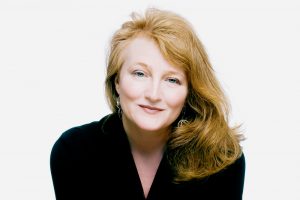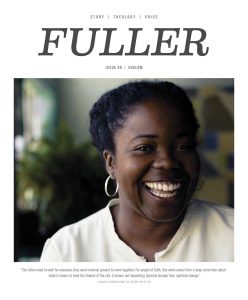 “Wisdom from above! It comes in many forms. All of them involve firm dependence on God, without whom all of life will turn foolish. . . . Nothing we do, in word or deed, shows as clearly that we have learned wisdom’s high lessons as when we pray. Wisdom begins with the fear of God; the fear of God begins in prayer.”
“Wisdom from above! It comes in many forms. All of them involve firm dependence on God, without whom all of life will turn foolish. . . . Nothing we do, in word or deed, shows as clearly that we have learned wisdom’s high lessons as when we pray. Wisdom begins with the fear of God; the fear of God begins in prayer.”
+ David Allan Hubbard, Fuller’s third president—for whom the Hubbard Library (pictured) is named—in The Book of James: Wisdom that Works. Speaking at the dedication of the library in 2009, Marianne Meye Thompson, George Eldon Ladd Professor of New Testament, said of Dr. Hubbard, “For him, ‘Christian’ was the noun and ‘intellectual’ the adjective, and not the other way. Intellectual work and academic endeavor were to be put into the service of the church and ministry, and this is what David taught and modeled.” In this spirit, imagery of the library is used throughout this section that reflects on wisdom in its many forms—all in the service of the church.
“Philosophical reflection is sustained by that which religion in its own way seeks to realize: love—the love of God, the love for God, and the love of human beings for one another. When brought together in disability perspective, wisdom and love are neither merely theoretical notions nor theological speculations; rather, they become the stuff by which philosophical reflection is supposed to be transformed so that the world might be changed.”
+ Amos Yong, director of the Center for Missiological Research and professor of theology and mission, in his essay “Disability and the Love of Wisdom.” Read more on able theology here.
“Wisdom and word are particularly apt figures in the development of Johannine Christology since neither wisdom nor word was considered a being or entity separable from God, such as an angel or prophet, who may choose to do God’s will or not. Both wisdom and word refer to something that belongs to and comes from God, some- thing inward or peculiar to God that is externally expressed. . . . To speak of Jesus as God’s word is to say that he is God’s self-expression, God’s thought or mind, God’s interior word spoken aloud, or in John’s description, made flesh.”
+ Marianne Meye Thompson, George Eldon Ladd Professor of New Testament, from John: A Commentary. Listen online to her reflect on the process of writing the commentary.
“Human minds are not sponges. . . . It’s more like a landscape or an ecosystem where certain things are going to grow in certain places but not others; certain ideas are going to be easier for human minds to process than others. These natural propensities that undergird religious thought are part of the ordinary equipment that humans have regardless of culture. . . . human minds are a fertile soil for plants we might call ‘religious.’ Culture gets to decide which plants are going to grow to a certain extent, but the plants are going to grow.”
+ Justin L. Barrett, professor of psychology and chief project developer for the Office for Science, Theology, and Religious Initiatives (STAR), reflecting on the ways wisdom, religion, and cognitive science intersect.
Understanding Wisdom

+ The façade of the Hubbard Library opens like a book—evoking, through its transparent and illuminated windows, the committed search for wisdom inside. The quotes on these pages come from Understanding Wisdom: Sources, Science, and Society, a Templeton Foundation–funded book edited by Travis Research Institute Director Warren Brown.
WISDOM + SUFFERING
“The mood of Job and Ecclesiastes is questioning. And the key expression of that questioning is their concern with death and with suffering, for these are two key human experiences, which threaten to subvert the confidence of wisdom. To put it another way, if wisdom cannot embrace these realities, if it cannot speak to these, then it subverts its own capacity to speak to anything else.” + John Goldingay, David Allan Hubbard Professor of Old Testament
WISDOM + INTUITION
“African proverbs . . . offer observations that are true as general rules but may not fit every case. The wise person is the one who knows intuitively which proverb carries the content and nuances most appropriate to a given situation.” + Stan Nussbaum, staff missiologist at Global Mapping International
WISDOM + SELF-DENIAL
“Wisdom’s emphasis on self-relinquishment . . . is noteworthy not because it is part of wisdom, but because it appears to be emphasized by wisdom because it is part of the human condition. The mystery is not just that some wisdom traditions assert [meaning], but that human beings actually do widely pursue scientific, artistic, and religious meaning at the expense of physical deprivation, social isolation, and even death.” + Jeffrey Schloss, professor of biology at Westmont College
WISDOM + NEUROPSYCHOLOGY
“Wisdom is a concerted function of the entire brain (and body). It involves judging truly what is right or fitting and being disposed to act accordingly. The impact of specific forms of brain damage or abnormal brain development on judging and acting helps to enlighten us as to the various neural systems and cognitive abilities that contribute to the wisdom of persons.” + Warren S. Brown, professor of psychology and director of the Lee Edward Travis Research Institute
WISDOM + KNOWLEDGE
“Wisdom is, at least partly, an aspect of the kind of intelligence on which adults principally rely—the intelligence that is maintained and/ or increased throughout a major portion of adulthood. This part of wisdom is a form of reasoning that relies on a large body of knowledge that is built up through a disciplined regimen of learning over an extended period of time; it is a kind of expertise.” + John Horn, late professor of psychology at the University of Southern California, and Hiromi Masunaga, professor of educational psychology at California State University, Long Beach
WISDOM + EMOTION
“Emotions play a crucial epistemic role in the moral life in their function of recording information. We can think of them as modes of attention enabling us to notice what is morally salient, important, or urgent in ourselves and our surroundings. . . . If emotions are antennae, they are antennae that can record with urgency and heat. Emotional data tend to leave tracks deeper than those of cold reason.” + Nancy Sherman, professor of philosophy at Georgetown University
WISDOM + YOUTH
“Wisdom is that domain of human experience that is concerned with the pragmatics of living. All the more important to adolescent development, it is wisdom that presents pragmatic guideposts for living against a context of transcendent meaning and purpose.” + James L. Furrow, Evelyn and Frank Freed Professor of Marriage and Family Therapy, and Linda M. Wagener, former faculty member and associate dean of the School of Psychology
WISDOM + MAXIMS
“Maxims have become an established tradition of human language and moral education precisely because they help young learners to store concepts in the mind more efficiently. In this way, maxims serve as metaphorical ‘clothes hangers’ on which to hang concepts—especially concepts that address ideals of self-motivation and moral behavior.” + Arthur Schwartz, professor of leadership studies at Widener University, and F. Clark Power, professor of education at the University of Notre Dame
“The beginning of wisdom is: acquire wisdom; and with all your acquiring, get understanding.” -Proverbs 4:7
 “Discerning calling is the long, complicated combination of convictions and context, of passion and prayer, of knowledge and need that seems to tap us on the shoulder and call forth from us an invitation into a process of self-discovery and humility, of taking up and laying down, of embracing and letting go that over time forms a deep, confident conviction that, of all things there are to do in the world, ‘This is mine to do.’”
“Discerning calling is the long, complicated combination of convictions and context, of passion and prayer, of knowledge and need that seems to tap us on the shoulder and call forth from us an invitation into a process of self-discovery and humility, of taking up and laying down, of embracing and letting go that over time forms a deep, confident conviction that, of all things there are to do in the world, ‘This is mine to do.’”
+ Tod Bolsinger, vice president and chief of Fuller’s Leadership Formation Platform and assistant professor of practical theology, in his essay “Formed, Not Found.”
“I often think of wisdom like a series of sinews that tie flesh and soul and body and mind together in that way you’re describing. It’s an integrated word; it’s never an isolated or autonomous experience. It’s about convergence and communion and connectedness and participation and vision—all those things are brought together.”
+ President Mark Labberton, speaking with Krista Tippett, founder and host of the public radio program and podcast On Being, on the role of wisdom in shaping public discourse. Listen to their whole conversation on the Conversing podcast.
 “Wisdom is recognizable and measured; it’s interactive. You don’t just say “He or she is a wise person,” but you know them by the effect they have on the world and on those around them. In this generation, there is this new longing to connect what you believe and who you are, this language of integrity and authenticity and transparency that has been introduced into our vocabulary as a reflection of that longing. And wisdom does that—it embodies these things we now are recognizing as so essential if we want to be whole.”
“Wisdom is recognizable and measured; it’s interactive. You don’t just say “He or she is a wise person,” but you know them by the effect they have on the world and on those around them. In this generation, there is this new longing to connect what you believe and who you are, this language of integrity and authenticity and transparency that has been introduced into our vocabulary as a reflection of that longing. And wisdom does that—it embodies these things we now are recognizing as so essential if we want to be whole.”
+ Krista Tippett, founder and host of the public radio program and podcast On Being.
Resources
Unspoken Wisdom: Truths My Father Taught Me
Ray Anderson (Wipf & Stock, 2013)
Understanding Wisdom: Sources, Science, and Society
Warren Brown, ed. (Templeton Foundation Press, 2000)
Walking in the Dark: Step by Step through Job
Daniel Fuller (Lulu.com, 2016)
Proverbs, Ecclesiastes, and Song of Songs for Everyone
John Goldingay (Westminster John Knox, 2014)
Beyond Futility: Messages of Hope from the Book of Ecclesiastes
David Allan Hubbard (Eerdmans, 1976)
The Book of James: Wisdom that Works
David Allan Hubbard (W Publishing Group, 1980)
The Wisdom of the Old Testament
David Allan Hubbard (Messiah College, 1982)
Useless Beauty: Ecclesiastes through the Lens of Contemporary Film
Robert Johnston (Wipf & Stock, 2011)
Available Classes
Job and Human Suffering with various faculty
Wisdom Traditions in the Old Testament with various faculty

